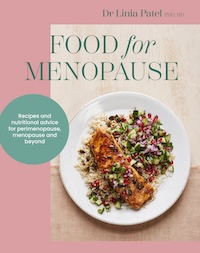Menopause weight gain is a struggle for many women. It isn’t all about aesthetics; it also increases your risk of chronic diseases like type 2 diabetes and high blood pressure.
Rapid weight loss is not sustainable. Healthy weight loss, where you protect your muscle and lose predominantly fat mass, is when you lose 0.5–1 kilogram a week. I recommend finding an objective way to monitor your progress. This doesn’t mean becoming obsessed with numbers.
Numbers don’t define you. However, it’s useful to know where you’re starting from and it’s a way to track your progress. Know the number on the scale but know other numbers too. What is your waist circumference? How many vegetables did you eat yesterday? How often have you exercised this week?
There are so many ways to lose weight. It’s about finding a way that works and feels good for you. I recommend maintaining a balanced diet overall, upping your veggies, prioritising protein and including some of the healthier carbs and some fat.
The key is to keep an eye on your portions. Putting down your fork between bites, chewing your food properly and savouring your meals helps you connect with feelings of fullness, which can help to manage overeating. Practise what the Japanese call hara hachi bu, or eating until you are 80 per cent full. Keep at least 10 to 12 hours between dinner and breakfast.
Fluids before meals
It’s easy to mistake dehydration for hunger. Ghrelin, the hunger hormone, is released when your stomach is empty. Having a glass of water before a meal or a soup to start is a great way to manage your appetite as it can temporarily turn off ghrelin.
Understand the types of hunger
Hunger is your physiological need for food, whereas appetite is your desire for food. Before you begin eating, try to check in with how your body is feeling. How hungry are you? Are you eating because you are physically hungry or is it out of boredom or anxiety?
Being severely hungry before a meal can make it difficult to slow down and eat mindfully. Commit to incorporating balanced meals throughout the day so you aren’t ravenous at mealtimes.
Recognise when you are eating for reasons other than physical hunger. If you have emotional hunger, try non-food solutions like journalling, changing your environment, taking a short walk, practising deep breathing or calling a loved one or a professional.
Snack smart
For the majority of people in the Western world, snacks contribute to 20 per cent of our daily calorie intake, so it’s important we plan for them. A healthy snack contains some fibre, as well as some protein or healthy fats.
Eat starchy carbs at the right time
Opt for low-glycaemic index (slow release) carbs that are whole foods or whole grains, as well as vegetables and fruit. Eat your starchy carbohydrates earlier in the day, at breakfast and lunch. Serve up the right carb portion sizes.
Consider a booze break
The “beer belly” isn’t a myth! Drinking too much alcohol encourages fat to be stored as visceral fat around the abdomen. The calories in alcohol are plentiful and “empty”. A bottle of wine contains 750 calories but offers the body nothing else. Alcohol can also change the way your body burns fat as it’s more focused on breaking down the alcohol than metabolising any of the other calories you consume. This encourages those excess calories to be stored as visceral fat. Alcohol also lowers willpower, making in-the-moment decisions like “chicken salad or burger and fries” much harder. Reduce your alcohol intake or consider a booze break.
Walk more
Movement in your day keeps your metabolism boosted. Park further from the office or get off at a bus stop earlier. Take the stairs instead of the lift. Monitor your steps. Aim for an average of 10,000 steps a day. Two thousand extra steps a week is a good incremental increase.
Address your stress
Stress puts your body into survival mode, which means fat loss is not a priority. Find ways to stimulate your vagus nerve as this allows your body to calm down. Some breathing exercises are a great place to start.
Keep a food diary
Keep a daily log of what you eat and drink and how it makes you feel to give insight into your eating habits and potential food sensitivities. You can also take it to a dietitian or registered nutritionist for their input.
Read next: 9 natural ways to support your menopause

Images and text from Food for Menopause by Dr Linia Patel, photography by Clare Winfield. Murdoch Books RRP $39.99.
How helpful was this article?
Click on a star to rate it!
5 / 5. 1
Be the first to rate this post!
Dr Linia Patel
Related posts
Subscribe
Receive personalised articles from experts and wellness inspiration weekly!


